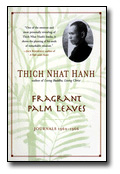Books |
Thich Nhat Hanh: Fragrant Palm Leaves
By
Published: Jan 01, 2006
Category:
Spirituality
Reading Thich Nhat Hanh is like having Michael Jordan teach you how to play basketball. The focus is not on the dazzling tricks. It’s about the fundamentals. And they are few — compassion, mindfulness, tolerance, breathing.
Hearing Thich Nhat Hanh lecture is to experience holiness on a very high order. We once drove hours to hear him talk about death. You would expect him to focus on theology. But what I took away was completely practical: Hold the dying person’s feet, as he/she may not feel connected to the earth.
But it is when he is most personal that Thich Nhat Hanh is at his best. And 1962 to 1966 were key years for him. With some other “committed” Buddhist monks, he had tried to broker peace in his native Vietnam. No one — not even the Buddhist hierarchy — wanted any. In 1966, he was exiled. (He didn’t return to Vietnam for 40 years.)
“Fragrant Palm Leaves” begins in a cabin in the New Jersey woods. It’s 1962. Thich Nhat Hanh is 36. American troops have not yet been dispatched to Vietnam, but there has already been death aplenty. Thich Nhat Hanh, sick of heart, has come to teach and study at Columbia University.
"Sick at heart” is a condition not unfamiliar to Americans. Sick at heart and not knowing how to make it better, or when it will change, or if life will get nastier before we feel a healing sun.
Well, consider this a book of instruction. [To buy the paperback from Amazon, click here. For the Kindle edition, click here.]
It begins with scenes of a peace that Thich Nhat Hanh can find anywhere, even in this unfamiliar country: “Some mornings I stay in the woods all day, strolling leisurely beneath the trees and lying down on the carpet of soft moss, my arms folded, my eyes looking up to the sky. In those moments, I’m a different person; it would probably be accurate to say that I am ‘my true’ self.” He is childlike: “Today I went with two eight-year-old boys to pick some [berries], and we stuffed our mouths until they turned blue!”
Surrounded by nature, he can’t help recalling Phuong Boi, the monastery he and some friends built in Vietnam. In 1957, its 60 acres cost $140. “Here, for the first time,” he recalls, “we were sheltered from the harshness of worldly affairs.” On full moon nights, in deep silence, he watches, in awe, as the moon and forest merge. By day, he works the land, meditates and prays. Walking can’t express his joy at being here — so he runs.
You may feel a great peace as you read his account of daily life at the monastery. At the same time, you’ll feel a deep dread — you know this peace can’t last. And, soon enough, the arrests begin: “You could be accused of being a Viet Cong by anyone who opposed you.”
For Thich Nhat Hanh, the war is both external and internal. “Finding truth is not the same as finding happiness,” he cautions. “You aspire to see the truth, but once you have seen it, you cannot avoid suffering.” And does he ever suffer! “I feel the unbearable pain of a woman who is about to give birth to a child she already knows will be sentenced to death.” But he always finds a balance. Suffering is a wonder. It helps us learn “how to ride the waves of impermanence, smiling as one who knows he has never been born and will never die.”
In 1964, he returns to Vietnam, and the ideas he explored in America are put to the test. He’s ten miles from Saigon now; he can hear gunfire. Phuong Boi has been abandoned. And the United States is pushing an unworkable strategy: “How can you win a war with bullets when you do not even know where the front line is?”
Now it is 1965. The house at Phuong Boi “is a pile of ashes where wild mushrooms grow.” And yet, for Thich Nhat Hanh, the house still exists — it was a place of love, and love endures. Indeed, if he too is burned to ashes, “those ashes will be love and will nestle in the heart of the earth to nourish the flowers.”
His conclusion couldn’t be more gorgeous: “We will return to the circle of life as flowers, grasses, birds or clouds to bring people the message of eternal love. Like the village children who, even in this time of war, sing: ‘We will love others forever and ever, hand holding hand. We love others forever.’”
What a thing to learn from war! And he learned it the hard way: “not from intellectual investigation but from my actual experience of suffering.” To have compassion for those who have made you suffer — I have such trouble with that. And yet, as Thich Nhat Hanh reminds us, there is no other answer.
From the New Jersey woods to Vietnam, and then beyond — in just 212 pages, Thich Nhat Hanh takes you very far. Like all the way to peace.


